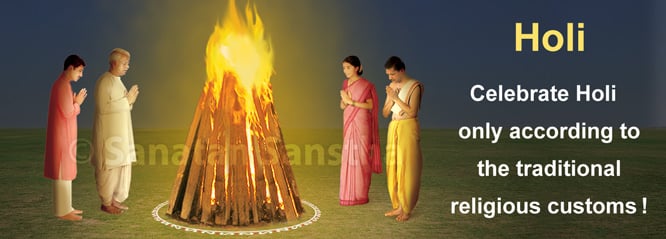
Phalgun Pournima to Panchami. The Holi festival is celebrated for two to five days depending on the regional variations. It has various names such as Hori, Dolyatra in North Bharat, Shimga, Holi, Hutashani mahotsav and Holikadahan (burning of Holika) in the state of Goa and Maharashtra, and Kamdahan (burning of desires) in South Bharat. This festival is celebrated as Dolyatra in the state of Bengal. It is also called Vasantotsav or Vasantgamanotsav, that is, the festival celebrated to welcome the Vasant (spring) season.’
To learn more about celebrating Holi as per Dharmashastra, please watch :
Rituals of Holi
Location and time
The Holi has to be lit in front of a temple or at a comfortable place on the evening of Pournima. Generally, this is done in front of the Gramdevta.
Practice
In the centre of the fire, there is either a castor-oil plant, coconut or areca-nut tree or sugarcane, around which dry cow dung cakes and dry wood are arranged. After a bath and recital of thedeshkal (Place and time), the person performing the ritual should first make the following resolve – “To get relief from the trouble caused by Dhundha, my family members and I worship Holika.” Next, the puja is performed, followed by offering of naivedya. After this, saying || Holikayai Namaha ||, the fire should be lit and circumambulated. Then make a shrill noise, with the palm over the mouth. After the fire is completely burnt, it should be extinguished by sprinkling milk and ghee. Fruits like coconut, grape fruit should be distributed to people assembled there. The entire night should be spent in singing and dancing.
The next day at dawn, after paying obeisance to the ash of the Holi, it should be applied to the body and then one should bathe. This prevents mental suffering and diseases. In the morning, the ash of the Holi should be immersed in flowing water after talking in an obscene language, followed by a prayer to Holi.
Do’s and Dont’s of the Holi Festival
- Burn dry wood instead of wet wood.
- Do not steal wood for the Holi bonfire.
- Celebrate Holi keeping in mind it’s purpose of uniting the Hindus.
Dhoolivandan
On this day either the ashes of Holi or dust is worshipped. This is the first day (pratipada) in the dark fortnight of the Hindu lunar month of Phalgun. Dhoolivandan is also known as Dhulvad in Marathi. After ritualistic worship the ashes of the Holi sacrificial fire is offered obeisance with the following mantra which means:
वन्दितासि सुरेन्द्रेण ब्रह्मणा शङ्करेण च ।
अतस्त्वं पाहि नो देवि भूते भूतिप्रदा भव ।।
Meaning : O Lakshmi, You are adored, worshipped by Brahma, Vishnu and Mahesh; and that is why O Goddess of prosperity, be an endower of prosperity to us and protect us.’
Rang Panchami
It is celebrated on the fifth day (panchami) in the dark fortnight of the Hindu lunar month of Phalgun by throwing a red, fragrant powder (gulal) and splashing coloured water, etc. on others.
Stop malpractices during the period of Holi to Rang Panchami
Now-a-days due to lack of Dharmashiksha among Hindus, festival of Holi is becoming obscene and corrupt due to some Hindus indulging in various malpractices. Teasing women, forcefully throwing colors on women and others, Use of harmful chemical-made colors etc. is going on. To stop such malpractices is duty of every devout Hindu.
Please do not indulge in malpractices during Holi and Rang Panchami
- Forcefully collecting money from others in the name of Holi festival
- Throwing balloons filled with filthy water, colors on others
- Wasting too much water for Holi
- Forcefully throwing colors on other people
- Don’t play loud music causing noise pollution
- Don’t burn tyres, plastic in Holi causing air pollution

 Kalki 2898 AD: Legal notice served to team for allegedly hurting Hindu sentiments
Kalki 2898 AD: Legal notice served to team for allegedly hurting Hindu sentiments NGO worker distributes books on Jesus to the school students in Vidisha (MP)
NGO worker distributes books on Jesus to the school students in Vidisha (MP) Kanwar Yatra: SC stays U.P., Uttarakhand directives to display names of food stall owners and staff en route
Kanwar Yatra: SC stays U.P., Uttarakhand directives to display names of food stall owners and staff en route ASI says ‘parts of pre-existing temples converted into a mosque’ in scientific report on Bhojshala complex
ASI says ‘parts of pre-existing temples converted into a mosque’ in scientific report on Bhojshala complex Fanatics attack Hindus in Bangladesh’s Dhaka, 60 injured
Fanatics attack Hindus in Bangladesh’s Dhaka, 60 injured ‘Majority will become minority if conversions continue’ : Allahabad HC
‘Majority will become minority if conversions continue’ : Allahabad HC